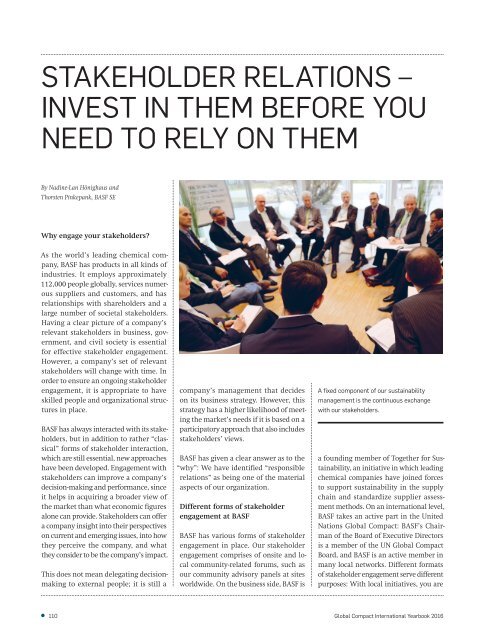Global Compact International Yearbook 2016
The Sustainable Development Goals are an ambitious agenda with 17 topics addressing the global challenges of our time. A key topic is innovation: Business must fit into planetary boundaries. This probably will not work with traditional business models. That is why we need new, fresh ideas. We need change, even when it happens in a rough, disruptive way. And the earlier the better. This is why the upcoming edition of the Global Compact International Yearbook, published in September 2016, has chosen sustainable innovation as the key topic. Also includes exclusive interviews with Angelina Jolie, Robert Redford and Sigourney Weaver. The Global Compact International Yearbook is with more than 500,000 readers one of the worlds leading CSR publications. Münster/New York 2016: 164 pages, paperback Publishing houses: macondo publishing/UN Publications Subscription (via UN Publications only): 30.00 USD (regular) 15.00 USD (reduced) ISBN13: 978-3-946284-01-7 / ISSN-Print: 2365-3396 / ISSN-Internet: 2365-340x
The Sustainable Development Goals are an ambitious agenda with 17 topics addressing the global challenges of our time. A key topic is innovation: Business must fit into planetary boundaries. This probably will not work with traditional business models. That is why we need new, fresh ideas. We need change, even when it happens in a rough, disruptive way. And the earlier the better. This is why the upcoming edition of the Global Compact International Yearbook, published in September 2016, has chosen sustainable innovation as the key topic.
Also includes exclusive interviews with Angelina Jolie, Robert Redford and Sigourney Weaver.
The Global Compact International Yearbook is with more than 500,000 readers one of the worlds leading CSR publications.
Münster/New York 2016: 164 pages, paperback
Publishing houses: macondo publishing/UN Publications
Subscription (via UN Publications only): 30.00 USD (regular) 15.00 USD (reduced)
ISBN13: 978-3-946284-01-7 / ISSN-Print: 2365-3396 / ISSN-Internet: 2365-340x
Create successful ePaper yourself
Turn your PDF publications into a flip-book with our unique Google optimized e-Paper software.
Stakeholder Relations –<br />
Invest in Them Before You<br />
Need to Rely on Them<br />
By Nadine-Lan Hönighaus and<br />
Thorsten Pinkepank, BASF SE<br />
Why engage your stakeholders?<br />
As the world’s leading chemical company,<br />
BASF has products in all kinds of<br />
industries. It employs approximately<br />
112,000 people globally, services numerous<br />
suppliers and customers, and has<br />
relationships with shareholders and a<br />
large number of societal stakeholders.<br />
Having a clear picture of a company’s<br />
relevant stakeholders in business, government,<br />
and civil society is essential<br />
for effective stakeholder engagement.<br />
However, a company’s set of relevant<br />
stakeholders will change with time. In<br />
order to ensure an ongoing stakeholder<br />
engagement, it is appropriate to have<br />
skilled people and organizational structures<br />
in place.<br />
BASF has always interacted with its stakeholders,<br />
but in addition to rather “classical”<br />
forms of stakeholder interaction,<br />
which are still essential, new approaches<br />
have been developed. Engagement with<br />
stakeholders can improve a company’s<br />
decision-making and performance, since<br />
it helps in acquiring a broader view of<br />
the market than what economic figures<br />
alone can provide. Stakeholders can offer<br />
a company insight into their perspectives<br />
on current and emerging issues, into how<br />
they perceive the company, and what<br />
they consider to be the company’s impact.<br />
This does not mean delegating decisionmaking<br />
to external people; it is still a<br />
company’s management that decides<br />
on its business strategy. However, this<br />
strategy has a higher likelihood of meeting<br />
the market’s needs if it is based on a<br />
participatory approach that also includes<br />
stakeholders’ views.<br />
BASF has given a clear answer as to the<br />
“why”: We have identified “responsible<br />
relations” as being one of the material<br />
aspects of our organization.<br />
Different forms of stakeholder<br />
engagement at BASF<br />
BASF has various forms of stakeholder<br />
engagement in place. Our stakeholder<br />
engagement comprises of onsite and local<br />
community-related forums, such as<br />
our community advisory panels at sites<br />
worldwide. On the business side, BASF is<br />
A fixed component of our sustainability<br />
management is the continuous exchange<br />
with our stakeholders.<br />
a founding member of Together for Sustainability,<br />
an initiative in which leading<br />
chemical companies have joined forces<br />
to support sustainability in the supply<br />
chain and standardize supplier assessment<br />
methods. On an international level,<br />
BASF takes an active part in the United<br />
Nations <strong>Global</strong> <strong>Compact</strong>: BASF’s Chairman<br />
of the Board of Executive Directors<br />
is a member of the UN <strong>Global</strong> <strong>Compact</strong><br />
Board, and BASF is an active member in<br />
many local networks. Different formats<br />
of stakeholder engagement serve different<br />
purposes: With local initiatives, you are<br />
110<br />
<strong>Global</strong> <strong>Compact</strong> <strong>International</strong> <strong>Yearbook</strong> <strong>2016</strong>

















